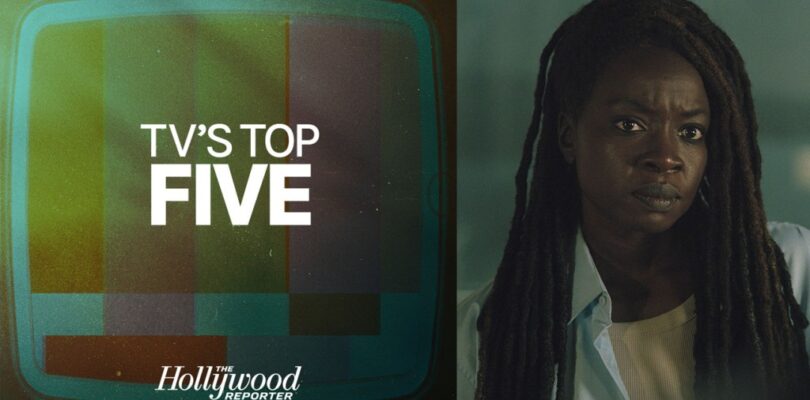Welcome to the 252nd episode of TV’s Top 5, The Hollywood Reporter’s TV podcast.
Every week, hosts Lesley Goldberg (West Coast TV editor) and Daniel Fienberg (chief TV critic) break down the latest TV news with context from the business and critical sides, welcome showrunners, executives and other guests, and provide a critical guide of what to watch (or skip, as the case may be).
This week, Danai Gurira joins us for a wide-ranging conversation about her return to The Walking Dead in The Ones Who Live, writing and serving as showrunner on the episode, and why telling Rick (Andrew Lincoln) and Michonne’s love story was important. The playwright also opens up about whether those skills can translate to Marvel and what she learned about the industry after what happened with Max’s Americanah. Read on for a few excerpts from the interview and listen to the full conversation in this week’s TV’s Top 5, below.
Let’s go back to before the pandemic. Walk us through your decision to leave The Walking Dead after season 10. What made the timing right?
It’s funny, they say seven is the number of completion. I had done seven seasons — it’s eight months of the year that you’re giving to this thing. I loved the commitment and the amount of time and energy it took. That’s what attracted me to the show. It just felt like the time was right to open myself up to other things and to explore other things and open up literally a different type of time in my life.
Did it feel like a closing of a chapter versus a pause while you did other things?
It was very clear that I was not done with her. Andy had already left, and he was not done with Rick, so it was clear he was coming back with the movies. It was always planned that I would do that with him, though we didn’t announce that. When I started negotiating out of the show, that was a part of it — that I would come back. We just didn’t know when and how; it took a different form than we planned.
The Ones Who Live was originally designed to be three feature-length films that Universal had signed on to distribute theatrically. What prompted the change?
It was definitely about [streamer] AMC+ coming into play. Then a new form being decided on, and then Andy and I were approached about co-creating a limited or a series of our choosing with Scott Gimple.
How did co-creating the series with the three of you work?
We did have a very unified idea about what we should make sure happens. The idea, which initially was Andy’s, was this is a love story of Rick and Michonne. When we got in the room, it was about the nitty gritty of turning a Walking Dead show into an epic love story. That was fun to do. I think I was more the expert on love stories between the three of us, so it was an interesting navigation of how to make sure that the love story was the propelling and driving force. The flagship [series] did not really allow for the time and the space for a two-hander. It was important to me that we make sure that the threads are coming together, that there’s a love story payoff at the core. That’s why episode four is important to me, because that’s where the love story payoff comes together, and all of their obstacles are clear.
The last two episodes of The Ones Who Live have yet to air, but is this the end of Rick and Michonne’s love story? Or is there room for a second season of this show?
You know I can’t answer that! But AMC handed us the reins. Ultimately, what you see is our vision.
The fourth episode is where Rick and Michonne put all their cards on the table. When did it become clear what the episode’s form should be? And when did you say, “I have to write this”?
We knew that this had to be the bottle episode, and then I said that’s the one I wanted to write. This had to be something that was about the conflict between these two and their love and whether or not it will prevail. That appealed to me because I’ve yearned to see more of it on the mothership, we just didn’t have the space for it.
What research did you do for the episode?
We had to understand Rick’s behavior; it cannot be a logical understanding. It has to be emotional; it has to be the thing that he’s not going to say until there’s a lot of walls broken down. I had to study a lot. I had to research a lot about PTSD because that’s what he’s going through. He has gone through a captivity, and a man like Rick — who’s a leader and was always in the frontlines of every battle — and now he can’t even get to his family for years, it’s a lot of trauma. Michonne was naive because she doesn’t understand why he’s not just being himself. She had to get to the point of understanding what it’s going to take to help him because she’s not using the right tools to help him initially. I was very keen on creating a love scene that was not a love scene we’ve seen a trillion times; it had to have something character-driven about it. So that moment for her is an anxiety attack/panic attack for Rick where his wound is exposed. In that level of vulnerability and intimacy, she finally sees him and understands that he has a wound that he can’t articulate.
You starred, wrote, showran and exec produced this episode, but you didn’t direct it. Is that something you’d like to do at some point?
Absolutely. I’m building toward that. There wasn’t even a chance in the world that I could direct this one.
Would you be interested in a Walking Dead: End Game of sorts in which all of the spinoffs are reunited to bring the franchise to a close, or do you feel like you have unfinished business with some of the other characters in this universe?
Anything’s possible. We poured all we had to try to make this very fulfilling experience for people because people waited for it for a long time.
Does having this kind of creative control on Walking Dead translate to similar opportunities with the Disney+ Wakanda series?
We’ll have to see how all that occurs. What I love about both these characters, is that they have a lot of story and dimension in them, and I adore them both. So we’ll have to see.
This interview has been edited for length and clarity. To hear much more from Gurira, listen to the full conversation from TV’s Top 5, above.



